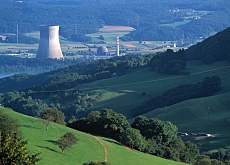
Government sticks with nuclear power

Atomic energy remains on the cards for the Swiss after the government decided new nuclear power plants were needed to prevent a power shortfall after 2020.
Political parties on the left and ecological organisations have criticised the move, but business leaders and the right are generally satisfied.
“The replacement or building of new nuclear power stations is necessary,” said Energy Minister Moritz Leuenberger in Bern on Wednesday as he presented the cabinet’s new energy policy.
The government predicts that, due to growing demand, current measures will be unable to guarantee Switzerland’s medium to long-term energy supply.
Switzerland is dependent on oil, gas and to some extent, electricity from abroad. Added to this, carbon dioxide emissions have to be reduced to meet targets set in the Kyoto protocol.
“We can’t carry on as we have been up to now, otherwise we are going to run into supply problems,” said Leuenberger. To counter this cabinet has chosen to focus on energy efficiency, renewable sources and large gas-fired power plants as well as nuclear power.
The energy minister described energy-saving measures as the key to securing Switzerland’s long-term supply of energy. Energy efficiency saves money, improves the efficiency of the economy and acts as an incentive for investing in new technologies, he added.
Under the new strategy, the government also places considerable emphasis on renewable energy, such as hydropower – Switzerland’s most important domestic source of electricity.
Shortage expected
However, a shortage is expected by 2020, which can only be partly met by conventional technologies and imports. As a result, gas power stations will also be built as a temporary measure, but any additional carbon dioxide emissions they produce must be compensated.
Another axis of the new strategy involves better international cooperation, especially with the European Union, said Leuenberger. Switzerland hopes to become part of the European trade in CO2 certificates as soon as possible.
By the end of the year, Leuenberger’s ministry is expected to produce an action plan detailing how the government can implement its new controversial policy.
It will detail measures such as a proposed CO2 tax, minimum energy standards for buildings and equipment as well as a system for the importation of energy-efficient cars.
Contrasted reactions
For Switzerland’s Green Party, the government’s strategy is too cautious and wrong in some cases. It said the cabinet’s decision on nuclear power was in contradiction with a sustainable energy policy.
For the ecological Swiss Energy Foundation, the government’s choice is not acceptable and lacks vision, while Greenpeace Switzerland said that the decision to stick with nuclear power was a policy that continued to encourage energy wastage.
The centre-left Social Democrats – Leuenberger’s own party – said though that while it was against the building of any new nuclear power plants, it was pleased with the emphasis on improving efficiency and renewable energies.
The centre-right Radicals welcomed the cabinet decision, but warned they would oppose the construction of gas-powered electricity plants. The other centre-right party, the Christian Democrats, toed the same line, but also expressed their reluctance to pursue the gas option, considering it a borderline solution.
Only the rightwing Swiss People’s Party was totally satisfied, calling the decision reasonable and realistic.
The Swiss Business Federation, economiesuisse, said the government hadn’t gone far enough with the policy, adding that trying to improve efficiency and boost renewable energies would not make enough of a difference to counter a power shortfall.
Switzerland’s electricity producers said for their part that all their demands had now been met and that they could go ahead with their projects for new nuclear power stations.
swissinfo with agencies
Electricity accounts for 23.2% of all energy consumption in Switzerland.
In 2003, the country’s five nuclear plants produced nearly 26,000 million kilowatt hours, or 38% of Swiss electricity.
The average for Europe is 33% (France: 78%/59 working reactors; Britain: 20%/23 reactors; Germany: 32%/17 reactors).
Swiss voters accepted in 1957 a constitutional article on nuclear power.
Switzerland’s first commercial nuclear plant, Beznau I in canton Aargau, went on line in 1969, followed by four others until 1984.
Nuclear power came in for criticism during the 1970s, preventing the construction of another plant. The project was abandoned in 1988.
Swiss voters rejected demands to end the use of nuclear energy three times between 1979 and 1984. But the Three-Mile Island incident in the US and the Chernobyl catastrophe in Ukraine increased fears about nuclear security.
In 1990, voters approved a ten-year moratorium on the construction of new nuclear power facilities. In 1998, the government decided that Swiss nuclear plants should be shut down.
But in 2000, Switzerland’s new CO2 law gave nuclear power, perceived some as a clean source of energy, a second wind. Three years later voters refused a new moratorium or to abandon nuclear power, and in 2005, the new nuclear energy law confirmed that atomic energy is an option.

In compliance with the JTI standards
More: SWI swissinfo.ch certified by the Journalism Trust Initiative

























You can find an overview of ongoing debates with our journalists here . Please join us!
If you want to start a conversation about a topic raised in this article or want to report factual errors, email us at english@swissinfo.ch.